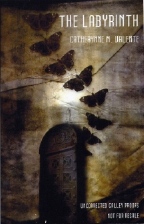The Labyrinth
Catherynne M. Valente
Prime Books
US Trade Hardcover
ISBN 0-894-81565-3
Publication Date: 07-15-2004
180 Pages; $29.95
Date Reviewed: 06-17-04
Reviewed by: Rick Kleffel © 2004

REFERENCES
COLUMNS
|
|
|
The LabyrinthCatherynne M. ValentePrime BooksUS Trade HardcoverISBN 0-894-81565-3Publication Date: 07-15-2004180 Pages; $29.95Date Reviewed: 06-17-04Reviewed by: Rick Kleffel © 2004 |
|
|
REFERENCES |
COLUMNS |
More so than usual, it's all down to the language.
"I am blind. Still in my statue-eyes I die in my steps blooming red and black. The glyphbody flies apart, together. The Stone burns all through me. Talmudic Walls rise, recede. I dive, I dart, I runrunrun."
Run, run, run indeed! Catherynne Valente does not just run; she flies, she swoops, she rips your brain out and puts it back in upside-down. Oops! When A Man Walks Into A Bar in her dense, intense and often funny novel 'The Labyrinth', it's not just a joke; it's a Gospel. At a slim 180 pages, you'll find more -- and less -- novel packed in here than in the usual 400 page brick o' book. Is it a prose poem, is it a poem, is it a novel? You certainly won't care what it is and you'll never trap it in words fewer than those given between the covers. Never, I say; never she says. And when Valente speaks, she sings and you surf. 'The Labyrinth' is a tidal wave of words, and no two ways about; surf or drown, surf or die. Enter 'The Labyrinth' at your own risk and expect to come out changed.
Valente's uncompromising narrative admits no before-time or after-time. It's unburdened by any connection to the reality you know other than the fact that it exists here and you can read it. Yes, you can read it. To be sure, there's a skill required. You've got to figure out how best to wrap your brain around it. Valente writes with three languages and three Oxford dictionaries worth of words buzzing in her head. Once you take the plunge, they'll be buzzing in yours. The setup is simple. The Walker -- apparently once a woman but certainly a woman no more -- is in the Maze. She's plunged into a surreal underworld on a Quest. There are Doors that are like large, predatory butterflies. You do not enter them. You are consumed by them. There are others in the maze, all the mythic helpers, re-mixmastered by Valente's powerful language. But let's get this straight. It's not poetry. It's prose so carefully built, so compact it has the density of poetry. Once you catch the wave, you'll understand.
So, yes, there are plenty of surreal sights and fast-talking flights of words that sequence into images alternately disturbing, disorienting and powerfully visual. Though the novel is unquestionably feminine, it's a frightening femininity. And though the unreality is unrelenting, Valente is smart enough to bring it together when the reader needs it whole, as one, comprehensible. In her interview, Valente reminds us that 'Alice in Wonderland' is the original feminine quest novel. 'The Labyrinth' works quite well in this mode of madness.
The potential problem for a novel like this is that it can sink under the weight of its own seriousness. Valente gets round this with an upfront sense of humor that permeates the book almost as strongly as does her sense of language. From the Gospel of A Man Walks Into A Bar to the Hoo Hoo of the Monkey-Merlin guide, Valente has fun and lets the reader have fun as well. This is a novel thick with talking critters that provide comic relief. A beautifully hallucinogenic interlude during which the Walker finds a key talisman concludes with the giver of the gift saying: "I Am a Meaningful Lobster." It's this ability to deflate her own narrative that enables the reader to keep riding, to catch the wave of words and fly through Valente's creation with a smile; perhaps a puzzled smile, but a smile nonetheless.
Readers who expect straightforward, easy plot and narrative had best not enter 'The Labyrinth'. This is not to say that the plot and narrative are not straightforward, but this is not a typical novel of any genre. It fits most comfortably into the world of Dark Fantasy, for it is both dark and fantastic. But in tone and feel, it's closer to Sylvia Plath's poetry than, for example, K. J. Bishop's 'The Etched City'. Of course, it also has a great deal in common with 'Alice in Wonderland'. Most importantly, it has nothing in common with any of them. 'The Labyrinth' is first and foremost it's own deal. You accept it or don't. It's your loss if you don't.
A trip through 'The Labyrinth' will certainly convince any reader that Valente has a powerful command of language. Given that, in this novel, she succeeds at creating a prose concoction that is utterly strange, without compare or even a firm reference point in this world or any other outside of the novel itself. 'The Labyrinth' is a powerful hallucinogen. Like most drugs, it doesn't just come and go. Once you've ingested it -- once it has ingested you -- the flashbacks are inevitable. Try not to preach the Gospel of A Man Walks Into A Bar in public however. Those who do not share your vision will look at you funny. But if you do, just hope that they don't turn into large talking rabbits or meaningful lobsters. If that happens, you're in trouble.